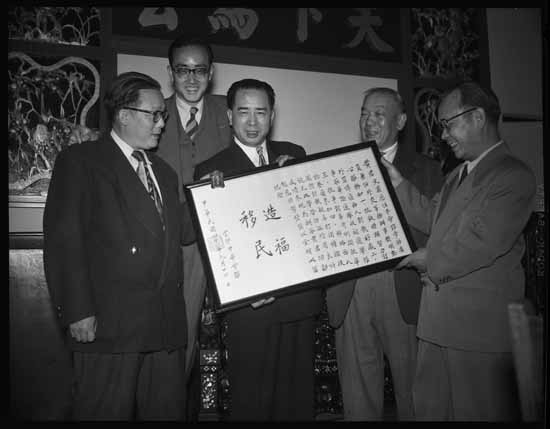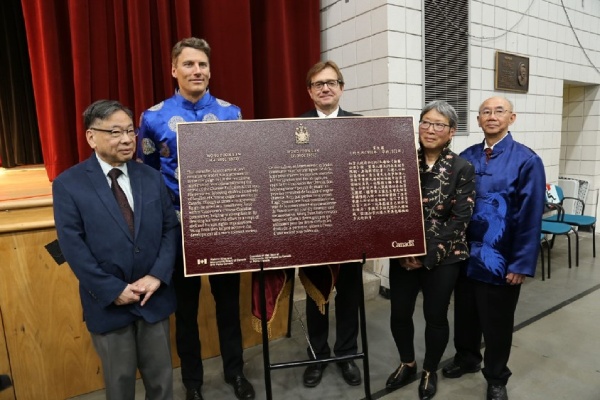Wong Foon Sien National Historic Person (1901-1971)

© William Cunningham / Vancouver Public Library / 60589
Wong Foon Sien was designated as a national historic person in 2008.
Historical importance: Ardent activist for the recognition of the rights of the Chinese-Canadian community and other minorities.
Commemorative plaque: 108 East Pender Street, Vancouver, British ColumbiaFootnote 1
Wong Foon Sien (circa 1901-1971)
This journalist, labour activist, and community leader was instrumental in the campaign to lift the remaining immigration restrictions following the repeal of the Chinese Exclusion Act in 1947. His persistent lobbying enabled hundreds of families of Chinese origin to reunite in Canada. Though at times a controversial figure, he acted as a conciliatory force within Vancouver's Chinese-Canadian community, helping to strengthen it. By devoting his time and effort to a range of civil and human rights organizations, Wong Foon Sien helped advance the development of a more tolerant society.
黃文甫(約生於1901年,卒於1971年)
加拿大政府於1947年廢除《排華法案》後,對華人移民仍存有諸多限制。身為新聞記者、工運人士和社區領袖,黃文甫先生在爭取華人享有平等移民權利的過程中扮演了關鍵的角色。他堅持不懈、奔走呼號,令數百戶華人家庭得以在加拿大團聚。儘管黃文甫先生曾是個富爭議性的人物,但他卻團結了溫哥華唐人街的社團組織,強化了華裔社區。此外,他奉獻出自己的時間和精力,參與眾多的民間和人權組織,促進加拿大建立更具包容性的多元化社會
Wong Foon Sien (circa 1901–1971)
For almost half a century, Wong Foon Sien fought for the civil and human rights of Chinese Canadians. He was a leading figure of the campaign for less restrictive immigration policies toward Chinese in the decade following the repeal of the Chinese Immigration Act in 1947, therefore contributing to the reunification of hundreds of Chinese families in Canada. He was an ardent activist for the recognition of the rights of the Chinese-Canadian community and other minorities, being actively involved in a number of civil and human rights organizations, and as such, contributing to the development of a more tolerant society. Through his work as a journalist, a labour activist and a community leader acting as a conciliatory force within Vancouver’s Chinese-Canadian community, he contributed to the development and maintenance of strong community organizations as well as to the welfare of the Chinese community of Vancouver.

Wong Foon Sien was born in China and as a child, his family immigrated to Cumberland, British Columbia where his father became a successful merchant. He studied law but worked as legal interpreter and translator because a requirement to be on the electoral list precluded Chinese Canadians from practicing in the professions. He later embarked on a career as a professional cultural broker between the Chinese community and other subgroups, exemplifying the style of ethnic leadership that emerged during the interwar years. While some detractors challenged his authority to speak for the entire Chinese-Canadian community, Wong Foon Sien’s exceptional skills in public relations and networking allowed him to serve as a leader within Chinese Canadian organizations and as a Chinese community representative to Canadian institutions.
Wong Foon Sien achieved what would become his most important legacy when he presided over the Chinese Benevolent Association (CBA) of Vancouver. From 1948 to 1959, he embarked on a national campaign to pressure the federal government for a more liberal immigration policy. Despite the repeal of the Chinese Immigration Act of 1923 (better known as the Exclusion Act), remaining restrictions made family reunification difficult. His widely publicized and professional campaign contributed to the achievement of a number of concessions, including the adoption of a successful scheme for bridal immigration.
He participated in a number of significant battles for the Chinese community, such as campaigns for the provincial and the municipal franchise. He also played a role as a union leader and was an active member of several organizations working for the welfare of the Chinese community, the recognition of civil and human rights, the betterment of working conditions, the harmonization of interracial relations as well as the promotion of Chinese and Canadian patriotism. As a journalist, he served on the editorial staff of the New Republic Chinese Daily out of Victoria, and contributed to other publications.
Known as the “the unofficial Mayor of Chinatown” and the “Champion of Chinese Rights,” Wong Foon Sien succeeded in gaining respect as a leader and a representative of the Chinese community in mainstream society.
Backgrounder last update: 2017-04-27
The National Program of Historical Commemoration relies on the participation of Canadians in the identification of places, events and persons of national historic significance. Any member of the public can nominate a topic for consideration by the Historic Sites and Monuments Board of Canada.
- Date modified :